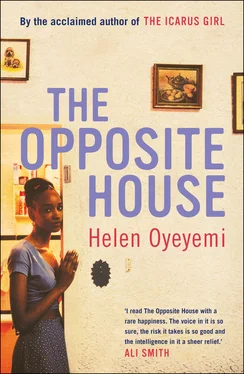Helen Oyeyemi - The Opposite House
Здесь есть возможность читать онлайн «Helen Oyeyemi - The Opposite House» весь текст электронной книги совершенно бесплатно (целиком полную версию без сокращений). В некоторых случаях можно слушать аудио, скачать через торрент в формате fb2 и присутствует краткое содержание. Год выпуска: 2008, Издательство: Bloomsbury UK, Жанр: Современная проза, на английском языке. Описание произведения, (предисловие) а так же отзывы посетителей доступны на портале библиотеки ЛибКат.
- Название:The Opposite House
- Автор:
- Издательство:Bloomsbury UK
- Жанр:
- Год:2008
- ISBN:нет данных
- Рейтинг книги:4 / 5. Голосов: 1
-
Избранное:Добавить в избранное
- Отзывы:
-
Ваша оценка:
- 80
- 1
- 2
- 3
- 4
- 5
The Opposite House: краткое содержание, описание и аннотация
Предлагаем к чтению аннотацию, описание, краткое содержание или предисловие (зависит от того, что написал сам автор книги «The Opposite House»). Если вы не нашли необходимую информацию о книге — напишите в комментариях, мы постараемся отыскать её.
The Opposite House — читать онлайн бесплатно полную книгу (весь текст) целиком
Ниже представлен текст книги, разбитый по страницам. Система сохранения места последней прочитанной страницы, позволяет с удобством читать онлайн бесплатно книгу «The Opposite House», без необходимости каждый раз заново искать на чём Вы остановились. Поставьте закладку, и сможете в любой момент перейти на страницу, на которой закончили чтение.
Интервал:
Закладка:
I said, ‘Papi! El es apenas un chico pequeño!’
Papi made a sign that I should quieten down and said painfully, ‘El debe aprender.’ He must learn. In English he said to Tomás, almost pleading, ‘Come on, T-boy, it’s unheard of.’ Tomás didn’t move or look up, but his breathing grew more laboured — he was about to cry. Amy Eleni gave me a wide-eyed sideways glance. Papi said, ‘Tomás! Dije, tragalo hacia abajo!’
Amy Eleni studied Papi and studied Tomás and said to the top of Tomás’s head, ‘Tomás, go on, throw up. I dares ya. If you throw up, I’ll do it too.’
Tomás’s eyes found Amy Eleni’s and he shook his head desperately from side to side — no, no, don’t you throw up.
‘What? You don’t want me to throw up all over the table? But I will. You think you’re so tough! You think you’re so clever to throw up like that? I can do it too!’
Chabella said, uncertainly, ‘Amy Eleni —’ but Amy Eleni made a fake gagging sound that was so slimily authentic that Tomás swallowed, burped, and squealed, ‘No!’ in a single moment of delighted horror.
‘We’re trying to eat!’ Mami said, bowing her head to Amy Eleni, her eyes full of thanks.
‘What’s wrong with you! Trying to throw up on the table!’ Tomás demanded of Amy Eleni, his face lit bright. It was the way Amy Eleni made my brother move when nothing else would move him that brought Papi to realise something. Before he put him to bed that night, Papi picked Tomás up under his arm, chuckling as he wriggled, and walked around the house with him, whispering things. I couldn’t hear what Papi told Tomás. But it must have been simple, because every now and again, Tomás replied calmly, ‘I know.’
Aya steps through her London door and crosses concrete slopes that balance drowsy houses on their shoulders. Night’s edge blunts itself at traffic-light level. Aya wishes that she could reach that night and bring it down. Her Aunty Iya could. Aya has seen her Aunty Iya stop walking, stretch languorously, then leap with her arms splayed against impact and sprint up into the atmosphere on a diagonal, hot sparks snapping from her heels as she wrests clouds open. Aya walks and wishes.
A girl sitting on the pavement with her legs crossed under her, this girl holds her hands out to Aya with soft words, words sighed more than said. Her smile is numb, fragile, milk and water. A round plaster at her temple drives back long black waves of her hair. The girl smells of wild honey, jellied amber so raw that fingers delving into its centre bring up the crisped black remnants of bees. The girl is saying, ‘Ye-ma-ya-Sa-ra-ma-gu-a-Ye-ma-ya-Sa-ra-ma-gu-a,’ and she rocks, wrapped in the rhythm of her own words, rapt like a child at play.
‘How do you know my name?’ Aya asks the girl.
The girl looks into Yemaya Saramagua’s eyes and slowly, painfully puts her smile away somewhere safe. The girl says to Aya, ‘I don’t know your name. What’s your name?’
A rainbow of blowsy silk handkerchiefs hangs from the girl’s belt. And when the girl says her name is Amy, to Aya this does not feel true. Amy puts out her hand for help, and to make a beginning of it, Aya helps her to stand up.
Amy lives on the top floor of a tall house with stairs that go apologetically naked after their third rotation. Inside, Amy’s warm honey smell drugs every hollow; the immediate inside rectangle of doorways, the cracks in the corners of window cases. This place is more of a home for books than it is for people; scruffy paperbacks lounge in heaps on the sofa, rickety shelves host a gap-strewn gallery of faded titles. The light, when it comes, will be full and frank; the night sky heaves against square windows wider than Aya’s outstretched arms. When Amy pleads with her to stay, Aya curls up in the contours of the armchair to wait. If you should find yourself in a place that is indifferent to you and there is someone there that your spirit stretches to, then that person is kin.
In the morning comes the man that Amy lives with, and Aya feigns sleep to watch him. He is beautiful. He might be from Abeokuta, where the essence of the Ewe poet stirs and causes cool-faced people to be born, cool-faced people whose hearts are self-stoked furnaces, great anger and great love. He stows his trunk into a space at the foot of the television. His gaze lingers on Amy who, still asleep, has curled up on the sofa so tightly that she is no more than a patch of denim topped with a tangle of brown hair, and then he bends over the trunk and snaps its locks open. The trunk is filled with ash, or grey sand, and he hunkers down beside it and makes a small, distressed sound, running his fingers through it, watching the grains whirl together into twisted fronds as they touch his hand.
When Tayo straightens, his eyes find Aya. Aya stays still, but she fears her face will crack under the pressure of keeping her eyes open to just this degree. Then, as the fear grows strongest in her, Tayo turns away. He softly tells the air, or Amy, ‘She’s very ugly.’
Amy surfaces from sleep for him, says, ‘Tayo.’
Blood mists her face in tiny, diamond buds.
Tayo kneels by her and says her name with sorrow and they lay their heads together and are hidden there in Amy’s pain and in her hair. When Aya comes to take Amy’s face in her hands, there is the bruise. It stains Amy’s cheek in dull blue and brown veins, starbursting as if a finger has punctured a pressure point in her cheek and opened other tunnels.
Amy touches Aya’s hand then, and smiling rigidly, she rolls up the sleeves of her long T-shirt, rolls socks down, brings daylight to bruises burnt old and deep purple, bruises clicking together around her arms like connected bangles, or another skin. Amy’s blood runs and will not turn back, though Aya counters it with water, with her vanilla. Tayo watches her. A smear of ash is on his temple. She cannot bear his gaze.
‘Have you come to help us?’ he asks Aya, and his laughter is so sudden and so quickly spent that it divides Aya from her nerve, sends her to the door, hauls her out.
10 presentiment (that long shadow on the lawn)
Magalys and her older brother Teofilo are the only people in the studio, and they are dancing together between the mirrored walls; he promenades her, then draws her to him, pretends to back away from her, beckons her on. They step slow, quick, quick, slow, quick and quick, to a Xavier Cugat song. It’s the kind of music I laugh at when Mami and Papi dance to it. But Magalys and Teofilo move and I see that inside this song there is something even, something near to perfection; there is a rhythm that a dance keeps.
Magalys in dance-teacher mode is scary-looking; she has added some drama by wearing a black flamenco skirt and bodice, hiding her hair beneath a black headscarf and daubing her lips with red lipstick. Teofilo, who has no place at all in my blurred memories, is half a head taller than Magalys and three years older, brown-skinned and curly haired. He smiles with sharp-looking teeth when he sees me, but he and Magalys dance the song to the end. I clap, and Magalys comes to embrace me. Teofilo holds out his arms in an invitation to dance. We consider each other. I say, ‘No, thank you,’ and forget to soften my refusal with a smile.
Teofilo laughs; the tape rolls on to the next song. ‘You’re Cuban? And you can’t dance El Son? Not even the basics of it? Nobody taught you El Son?’
His English accent is better than Magalys’s.
‘She should know it in her bones,’ Magalys gasps, pretending shock from her place on the floor, where she is changing her dance shoes for trainers. I feel attacked, so I smile. He takes my hand. ‘Come, I’ll show you.’
Читать дальшеИнтервал:
Закладка:
Похожие книги на «The Opposite House»
Представляем Вашему вниманию похожие книги на «The Opposite House» списком для выбора. Мы отобрали схожую по названию и смыслу литературу в надежде предоставить читателям больше вариантов отыскать новые, интересные, ещё непрочитанные произведения.
Обсуждение, отзывы о книге «The Opposite House» и просто собственные мнения читателей. Оставьте ваши комментарии, напишите, что Вы думаете о произведении, его смысле или главных героях. Укажите что конкретно понравилось, а что нет, и почему Вы так считаете.












